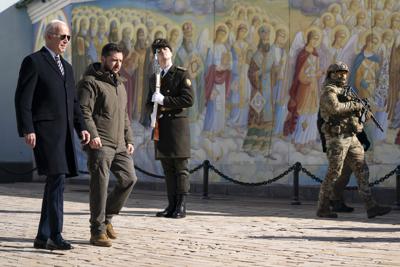US President Joe Biden made an unannounced visit to Ukraine on Monday to express solidarity with the Ukrainian nation ahead of the first anniversary of Russia’s invasion of its weak neighbour. During the visit, Mr. Biden met with his Ukrainian counterpart President Volodymyr Zelenskyy and assured him of the US’s unwavering support of Ukraine in its fight against Russia for as long as it takes and reaffirmed America’s commitment to Ukraine’s democracy, sovereignty, and territorial integrity. Following Biden’s visit to Kyiv, the state department has announced additional military support, economic assistance, and a fresh barrage of sanctions against Russian entities and individuals to ramp up pressure against Moscow’s authoritarian regime.
The war in Ukraine has marked its first anniversary while completing a whole year of unprecedented bloodshed, and destruction, in addition to thousands of causalities and displacement of millions of innocent Ukrainians, who witnessed unimaginable sufferings and misery over the past 12 months. Undoubtedly, the Russia-Ukraine conflict has brought some of the deadliest effects to the nations farther away from the conflict zone in Eastern Europe while the energy crisis, price hikes, and currency devaluation almost hit each nation around the globe. Meanwhile, western sanctions seriously undermined the global trade and foreign relations of nonaligned countries in the world.
One year after Russian tanks rolled into Ukraine, the hopes for an early and peaceful resolution of the Ukraine issue diminished and fear of a wider conflict or world war III involving exchanges of nuclear warheads between Russia and Ukraine’s western allies became more relevant in the contemporary world. The western bloc including Australia and Japan supported Ukraine through all possible means, while Minsk facilitated Moscow’s invasion agaisnt its weak neighbor and Kremlin also enjoyed Beijing’s cooperation to mitigate the worst effect of the sanctions imposed by the west. Recently, the European Union has provided Kyiv with heavy weapons including aircraft, tanks, missiles, and other military hardware to compete with its staunch enemy. Meanwhile, western Intelligence has expressed concerns regarding the possibility of Chinese military assistance to Russia which could alter the current strategic dynamics in Eastern Europe and also provoke a global conflict in the future.
Presently, President Zelenskyy is persistently pushing his allies for the provision of the latest military hardware including US-made F-16 fighter jets or similar other European airplane to counter Russia in the Donbas region, however, western strategists are conscious about providing such lethal weapons to Kyiv that might enrage Krimlen to directly challenge NATO and it’s regional allies. Western policymakers fear similar conditions if Beijing offers substantial military support to Moscow that might imbalance the geostrategic matrix in the region.
The current trajectory of the events portrays a vicious picture of the regional peace which is blatantly being challenged by the warring blocs in one or the other way. Moscow demilitarization and denazification operations against Kyiv could not seize their stated objective while the west’s defense of democracy and the western legacy still faces a heightened risk in the region. The situation has been complicated by a year-long hostility and the possibility of a wider conflict increases every other day. Both warring blocs have ramped up their efforts to champion the competition, so peace is unlikely to prevail in the universe until aggressors pause their hostility in the future.







